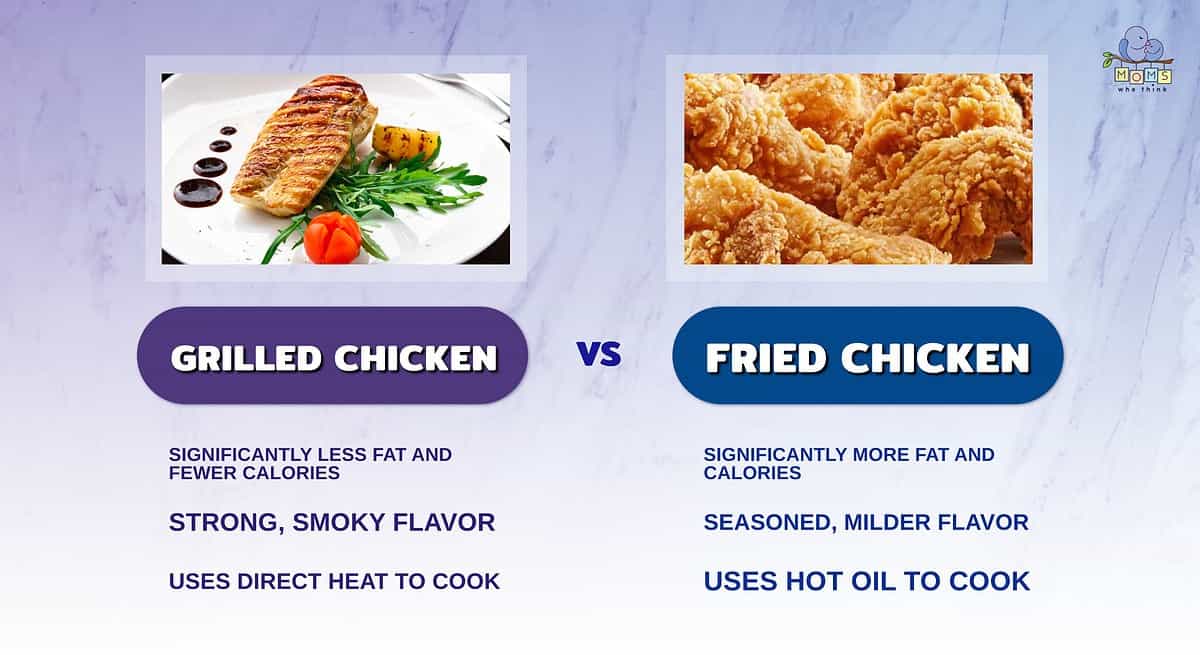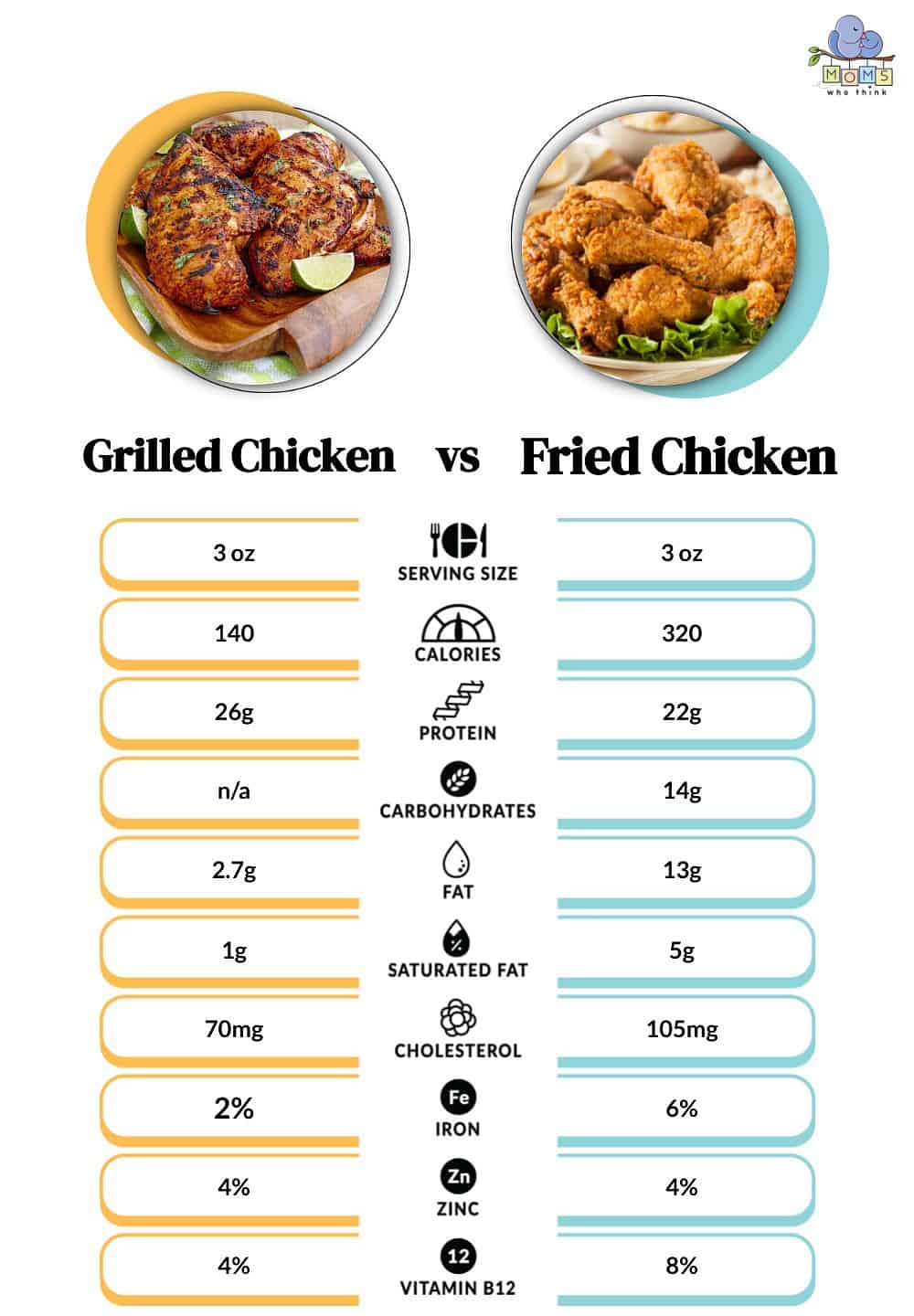Grilled chicken contains approximately 165 calories and 3.6 grams of fat per 3.5-ounce serving, while fried chicken has 250+ calories and 12+ grams of fat for the same portion. Both provide around 31 grams of protein, but grilled chicken is superior for heart health, weight management, and maintaining nutritional value due to its lower fat content and healthier cooking method.
| Nutritional Factor | Grilled Chicken | Fried Chicken |
|---|---|---|
| Calories (3.5 oz serving) | 165 | 250+ |
| Fat Content (grams) | 3.6 | 12+ |
| Protein (grams) | 31 | 31 |
| Heart Health Impact | Positive | Negative |
| Weight Management | Beneficial | Less Ideal |
| Primary Flavor Profile | Smoky, Herbal | Crispy, Savory |
| Best For | Regular Meals, Health-Conscious Diets | Occasional Treats, Comfort Food |
Introduction
Grilled Chicken vs Fried Chicken Overview
If you love chicken you know there’s always a lively debate over grilled vs. fried chicken. Grilled chicken gets a lot of praise for being healthier while fried chicken wins hearts with its super crispy goodness. Each way of cooking gives its own vibe and can be perfect for different times and cravings.
Think of grilled chicken as that friend who’s always encouraging you to make good choices while fried chicken is like that indulgent treat we all look forward to on weekends or family get-togethers. The different cooking methods not only change up the flavors but also really shake up the nutritional info.
Why Look at Nutritional Values
When you have to pick between grilled and fried chicken it’s important to think about what each option brings in terms of nutrition. Here’s why checking out the numbers is a good idea:
- Health Matters: Knowing what’s in your food can help you make smarter choices.
- Managing Weight: If you’re keeping an eye on calories knowing the difference helps you choose meals wisely.
- Diet Goals: Things like heart health and cholesterol are key when picking which one fits your dietary needs better.
By breaking down the nutritional facts of these two chicken champs you’ll be able to enjoy your meals without feeling guilty about your health.

Nutritional Breakdown
Calories and Macronutrients
When comparing grilled chicken to fried chicken the calorie difference is pretty big. For example a 3.5-ounce piece of grilled chicken breast has around 165 calories while the same amount of fried chicken can go up to 250 calories or even more. This calorie jump mostly comes from the oil that soaks up during frying.
- Grilled Chicken: 165 calories
- Fried Chicken: 250+ calories
Fat Content Comparison
Fat content is another major area where grilled and fried chicken differ a lot. Grilled chicken definitely takes the lead here with about 3.6 grams of fat per serving most of which are the healthier unsaturated fats. On the flip side fried chicken can be loaded with 12 grams of fat often including not-so-good saturated and trans fats from frying.
- Grilled Chicken: 3.6 grams of fat
- Fried Chicken: 12+ grams of fat
Protein Analysis
Both grilled and fried chicken dish out a solid amount of protein. Each one packs around 31 grams of protein per serving which is great for building muscle and feeling full. But since grilled chicken has healthier fats it generally scores better nutritionally.
Cholesterol Levels
Cholesterol is another big player in this health chat. Grilled chicken is lower in fat so it’s less likely to spike those bad cholesterol levels making it a heart-friendly choice. Fried chicken’s higher saturated fat content can really affect cholesterol especially if eaten a lot.
Overall grilled chicken is the better pick when it comes to nutrition compared to fried chicken making it a good choice for those who care about their health.

Health Impact
Heart Health Factors
When it comes to heart health grilled chicken really shines. With its lower calories and fat especially saturated fats it stands out as a heart-friendly choice. The lean protein in grilled chicken can actually help keep cholesterol at bay. Meanwhile fried chicken tends to raise bad cholesterol and could boost the risk of heart disease if eaten often.
- Grilled Chicken: Helps heart health with lean protein and lower fats.
- Fried Chicken: Can raise bad cholesterol due to unhealthy fats.
Weight Management Impact
If you’re all about managing your weight grilled chicken usually comes out on top. With fewer calories than fried chicken it lets you enjoy chicken dishes while keeping calories in check. Plus grilled chicken’s high protein content helps you feel full making it easier to stick to a healthy weight.
- Calories: Grilled chicken ~165; Fried chicken ~250+
- Protein: Both options are high in protein but grilled chicken is better for weight goals.
Blood Sugar Levels
Both grilled and fried chicken have a low effect on blood sugar making them good picks for most diets. However fried chicken might have a bit more impact because of the breading which has carbs.
- Grilled Chicken: Little effect on blood sugar.
- Fried Chicken: May raise blood sugar just a bit more.
Vitamins and Minerals Consideration
When it comes to holding on to nutrients grilled chicken usually keeps more vitamins and minerals than fried chicken. That’s mainly because grilling doesn’t lose as much in nutrients compared to frying.
- Vitamins: Grilled chicken retains more giving you better nutrition.
- Minerals: Frying can lose some nutrients.
In the end when you weigh the health impact of grilled versus fried chicken grilled chicken comes out on top for heart health weight management and keeping nutrients intact.

Cooking Methods
Grilling Benefits
Grilling is more than just a way to cook chicken it’s a fun experience that packs in flavor and nutrition. One awesome thing about grilling chicken is how it keeps natural nutrients intact. Cooking over an open flame helps hold onto protein while letting some fat drip off resulting in a lean and tasty dish.
Check out these grilling perks:
- Flavor Boost: That smoky char flavor really takes chicken to the next level making it a cookout must-have.
- Healthier Choice: Grilled chicken uses less oil so it’s lower in calories and fat which is great for those watching their diet.
- Flexibility: You can easily add various seasonings or marinades to grilled chicken from zesty lemon to spicy blends.
Frying Risks
On the flip side frying chicken comes with some downsides that might outweigh its yumminess. Sure fried chicken gives you that crunch but the frying process usually means dunking the chicken in oil which leads to higher calorie and fat numbers.
Here are some of the pitfalls of frying:
- More Calories: Fried chicken can have over 250 calories per serving which could lead to weight gain if you eat it too often.
- Unhealthy Fats: Frying introduces unhealthy trans fats that can raise cholesterol.
- Messy Cleanup: Frying can be messy needing you to deal with leftover oil and being careful to avoid burns.
So yeah while grilling usually encourages healthier eating frying can lead to some fun indulgence you should enjoy in moderation.
Taste and Texture
Flavor Profiles
The flavors of grilled and fried chicken really show a different culinary scene that speaks to different taste buds.
- Grilled Chicken: Grilling gives chicken a smoky flavor that makes it really pop. This method uses the Maillard reaction which creates that nice crust as the surface caramelizes. You can really boost the flavor with marinades using herbs spices or zest from citrus.
- Fried Chicken: Fried chicken is all about that crunchy golden-brown coating. The crispy outside sprinkled with spices and flour contrasts beautifully with the juicy meat inside making it a top comfort food for many.
Moisture Retention
Keeping chicken moist is super important and both cooking methods have their strengths.
- Grilled Chicken: If grilled right chicken holds onto a lot of moisture especially if marinated first. Cooking quickly over high heat seals in the juices giving you a tender flavorful piece.
- Fried Chicken: Frying does a great job keeping moisture intact due to that crispy crust. But overcooking can lead to greasy or dry chicken.
To sum it up grilled chicken gives you a lean juicy experience with nuanced flavors while fried chicken delivers that crispy comforting texture that many crave.

Myth Busting
Myth 1: Grilled Chicken is Always Better for You
It’s a common belief that grilled chicken is the healthier choice but that’s not always true. How healthy grilled chicken really is depends on how it’s prepared and what seasoning is used. For instance if it’s drenched in high-calorie marinades or cooked with too much oil it can end up being less healthy than people think.
- Tip: Stick to lighter marinades with herbs spices and citrus for flavor without the extra calories.
Also remember that how much you serve matters. Overdoing it with grilled chicken can pack on the calories too. So while grilled chicken is generally a better choice it’s good to think about how it’s made.
Myth 2: Fried Chicken is Always Bad for You
Another big myth is that fried chicken has no health benefits at all. Sure frying adds calories and bad fats but fried chicken can still give you a decent amount of protein and some nutrients.
- Reality Check: The nutrition really does depend on the quality of the chicken and the breading; whole-grain breading can add more fiber.
In moderation enjoying fried chicken can fit into a balanced diet. It’s really about making mindful choices that suit what you’re aiming for health-wise. So go ahead and enjoy your favorites while also keeping nutrition in mind!
Simple Tips
Making Better Choices
Choosing healthier chicken meals can feel tricky but some easy tips can help you out. First make sure to watch your portion sizes and the ingredients in marinades when you go for grilled chicken.
- Pick Lean Cuts: Go for skinless chicken breasts to cut down on fat.
- Be Careful with Marinades: Go for lighter marinades with natural ingredients like herbs spices lemon juice or vinegar instead of heavy sauces that can add calories.
- Think About Cooking Methods: Whenever you can grill bake or broil your chicken instead of frying to keep it on the healthier side.
Example: A quick marinade with olive oil lemon juice and garlic can turn your chicken into a tasty dish without sacrificing health!
Better Cooking Techniques
The way you cook chicken can really change its nutritional value. Here are a few tips to help you get the most health benefits:
- Grilling: This method lets fat drip off leading to a cleaner healthier meal.
- Baking: Simple and healthier bake your chicken with veggies for a complete meal.
- Air Frying: Air fryers can give you that crispy texture of fried chicken without packing on the oil and calories.
By picking the right ingredients and cooking techniques you can dig into delicious chicken dishes that fit into your health goals!
Frequently Asked Questions
Is grilled chicken always healthier than fried chicken?
While grilled chicken is generally healthier than fried chicken due to lower calories (165 vs 250+) and fat content (3.6g vs 12+g), the preparation method matters. Grilled chicken with heavy oil-based marinades or excessive seasoning can increase its calorie content. Similarly, oven-fried chicken with minimal oil can be a healthier alternative to traditional deep-fried chicken. For optimal health benefits, choose skinless grilled chicken with light seasonings and herbs.
How much protein is in grilled chicken compared to fried chicken?
Both grilled and fried chicken contain approximately the same amount of protein, about 31 grams per 3.5-ounce serving. The cooking method doesn’t significantly affect the protein content, though the nutritional profile differs in other aspects such as calories and fat. This makes both options good protein sources, but grilled chicken offers this protein with fewer calories and fat.
Can fried chicken be part of a healthy diet?
Yes, fried chicken can be included in a healthy diet when consumed in moderation. Consider it an occasional treat rather than a regular meal option. You can also make healthier versions at home by using air fryers, oven-baking with a light coating of oil, or choosing healthier oils like olive or avocado oil. Pairing fried chicken with nutrient-dense sides like salads or vegetables can also help balance the meal’s overall nutritional profile.
What are the best marinades for grilled chicken that don’t add excessive calories?
Healthy, flavorful marinades for grilled chicken that don’t add excessive calories include combinations of lemon juice, vinegar (apple cider, balsamic, or red wine), fresh herbs (rosemary, thyme, basil), garlic, ginger, and small amounts of olive oil. Yogurt-based marinades are also excellent for tenderizing chicken while adding protein. Avoid marinades with high sugar content, excessive oils, or pre-packaged options with preservatives and sodium. A simple mixture of lemon juice, minced garlic, and herbs can enhance flavor without significant calorie addition.
How does the cooking method affect the vitamin and mineral content in chicken?
Cooking methods significantly impact the vitamin and mineral content in chicken. Grilling generally preserves more nutrients because the cooking time is shorter and there’s less exposure to water that can leach water-soluble vitamins. Frying can cause greater nutrient loss due to higher temperatures and longer cooking times, plus the addition of oils can alter the nutritional profile. Some B vitamins may be reduced during frying, while minerals like iron, zinc, and phosphorus are better retained regardless of cooking method. For maximum nutrient retention, avoid overcooking chicken regardless of the method used.
What are healthier alternatives to traditional fried chicken?
Healthier alternatives to traditional fried chicken include air-fried chicken, which uses minimal oil while achieving a similar crispy texture; oven-baked chicken with a light coating of oil and breadcrumbs; pan-seared chicken with a small amount of heart-healthy oil; or “flash-fried” chicken that’s briefly fried and then finished in the oven. You can also try using whole grain breading, removing the skin before cooking, or using skinless chicken pieces to reduce fat content while maintaining flavor and texture.
Wrap Up
Key Points Recap
As we’ve enjoyed diving into grilled chicken vs fried chicken here are some key takeaways:
- Nutritional Value: Grilled chicken is the healthier pick with fewer calories and fat plus it keeps more nutrients than fried chicken.
- Taste and Texture: While grilled chicken brings a smoky flavor and tender juiciness fried chicken offers a crispy outer layer and juicy inside.
- Health Impacts: Regularly eating fried chicken can lead to more health risks while grilled chicken helps with weight management and heart health.
- Cooking Methods: Both grilling and frying have their perks; grilling reduces fat while frying delivers that crunchy treat.
Final Take on Grilled vs Fried Chicken
In the tasty matchup between grilled and fried chicken it’s really all about what you like and what your dietary goals are. If health and keeping nutrients intact matter most grilled chicken is likely your best option. But if you want some comfort food fried chicken can still make an appearance in your diet—just remember to enjoy it sparingly.
In conclusion grilled and fried chicken can happily coexist on your plate giving you different flavors and textures to satisfy various cravings. So treat yourself wisely savor every bite and enjoy the journey of flavors!

A Bergen County institution celebrating authentic Jewish cuisine since 1985. Our pastrami—brined for 14 days, smoked over applewood for 12 hours, and steamed to perfection—creates a melt-in-your-mouth experience that rivals Manhattan’s finest delis. Our rye bread is baked fresh daily using a century-old recipe from Poland. Featured in Food & Wine’s “Top 10 Delicatessens in America” and on Food Network’s “Best Thing I Ever Ate.” Chef Moshe Greenbaum, a third-generation deli master trained at the Culinary Institute of America, ensures every sandwich meets our exacting standards. No wonder our customers drive from three states away.
Leave a Reply